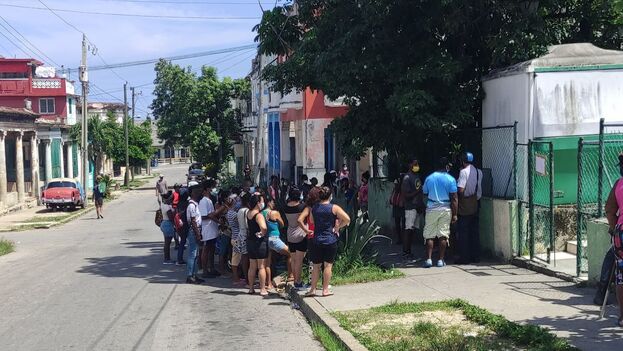
![]() 14ymedio, Juan Diego Rodríguez, Havana, 2 November 2022 — The residents of Luyanó, in Havana, say that his name was Arístides and he lived on Manuel Pruna Street, at the corner of Municipio. This Tuesday, he was found dead at the doors of the nearby store on Melones Street, between Enna and Guanabacoa, where he had been standing in line for several days trying to buy something.
14ymedio, Juan Diego Rodríguez, Havana, 2 November 2022 — The residents of Luyanó, in Havana, say that his name was Arístides and he lived on Manuel Pruna Street, at the corner of Municipio. This Tuesday, he was found dead at the doors of the nearby store on Melones Street, between Enna and Guanabacoa, where he had been standing in line for several days trying to buy something.
Hours after the old man’s body was taken away, the establishment was the subject of a police operation made public on networks by the government of the municipality of Diez de Octubre.
Without alluding to Arístides’ death, a post with images reported on Facebook about the merchandise they found “reserved” at the store. Among the items were 11 packages of chicken “with proof of payment” that, according to the clerks, “belong to the LCC (Lucha Contra Coleros),” that is, to the agents of the groups of the so-called “Fight Against Coleros*.”
They also found “6 packages of chopped meat, 11 bottles of Sedal shampoo,” in addition to three other bottles of shampoo, three bottles of conditioner, valued at 160 pesos each, three “wheels” of H. Upmann cigars and 1,190 pesos inside a drawer in the store manager’s office. In it they also detected “a shortage” of 6,129 pesos “corresponding to sales of October 31, 2022.”
“You also know that what you found is a small part of everything that goes out the back door”
“All the confiscated products were sold to 5 people from the population, including a mother with a child under 1 year old,” detailed the publication, which immediately filled with comments.
Most of them criticize the military troops deployed to fight coleros, a strategy deployed in the midst of the COVID-19 pandemic to combat hoarders, for which personnel from the Ministry of the Interior and organizations at the service of the regime were used (such as the Committees for the Defense of the Revolution and the Federation of Cuban Women), which was never cancelled.
“You also know that what you only found is a small part of everything that goes out the back door,” says commentator González Monyk. “The manager, the financial personnel, the clerks, the floor cleaners, etc. steal, and the stolen items are removed from the store by the regular customers who shop daily, or through the back door after hours. I know you know it, but I repeat it over and over again: This system does not work and will never work.”
“The LCCs have been a shame,” says Lissette López. “In an infinite hell they have upturned the lives of hard-working citizens. They mistreat and divert what belongs to the people with absolute impunity.”
“That man had been in line for days without being able to buy, because what they got going in there is astonishing”
Tamara Valdés Pérez agrees with her, and elaborates about another business located on Espadero street, La Víbora, in the same municipality as Diez de Octubre: “Just after the chicken arrived, they tell you that there is enough for only 20 people. You can see the motorcycles come and go with your own eyes, taking chicken. That’s why they keep the lines a block away. If there is no more COVID, what’s the point?”
“Today was horrible in Espadero,” says Nydia Rodríguez. “People standing in line for days, the chicken arrives, 20 people, 15 susceptible, and the chicken in the dependents’ backpack.”
The list displayed in the comments about the stores in which Havana citizens express grief about the corruption of the “LCCs” is long: 15th Street and Concepción in the Lawton neighborhood; The Danube in El Vedado; The Cupet de Lagueruela in La Víbora; the store at 84th and 41 stin Marianao; Concha y Fábrica in Luyanó; Cupet de Luco and Calzada de Luyanó, 15th and Dolores in Arroyo Naranjo, where they also complain about El Eléctrico Development.
All in all, the commentators celebrate the operation in Melones, although they point out that “it should have been carried out periodically.”
“A person had to die for them to come to investigate,” a Luyanó neighbor told 14ymedio. “That man had been in line for days without being able to buy, because what they got going on in there is astonishing.” Indeed, it is not the first time that the Melones Street establishment has been the object of complaints by the population, who have been witnesses to the ‘diversions’ for months.
The residents of the place, as they recorded on social networks, are now looking for the dog that accompanied Aristídes, who walked with a cane and, according to another neighbor, had “a son who lives far away” as his only family.
*Translator’s note: Coleros, from “colas” (waiting lines – the same word also means ‘tail’), are individuals who hold places for others who pay them for the service.
Translated by Norma Whiting
____________
COLLABORATE WITH OUR WORK: The 14ymedio team is committed to practicing serious journalism that reflects Cuba’s reality in all its depth. Thank you for joining us on this long journey. We invite you to continue supporting us by becoming a member of 14ymedio now. Together we can continue transforming journalism in Cuba.
